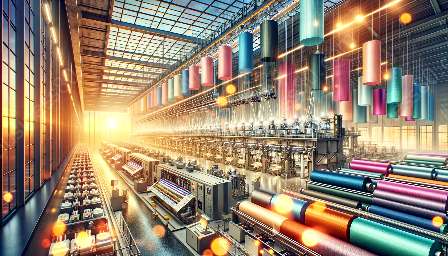Textile recycling plays a crucial role in the sustainability of the textiles & nonwovens industry. The life cycle assessment (LCA) of textile recycling is a comprehensive evaluation of the environmental impact of the entire process, from collection to reprocessing, highlighting its significance in sustainable development.
Understanding the Textile Recycling Process
Textile recycling involves the collection, sorting, processing, and reuse of textile materials to create new products or raw materials. The process aims to minimize waste, conserve resources, and reduce environmental impact.
Conducting a Life Cycle Assessment (LCA)
Performing an LCA of textile recycling involves assessing the environmental impact of each stage of the textile recycling process, including raw material extraction, production, transportation, and end-of-life disposal. This holistic approach provides valuable insights into the environmental footprint of textile recycling.
Environmental Impact of Textile Recycling
Textile recycling has the potential to significantly reduce the environmental impact of the textiles & nonwovens industry. By diverting textile waste from landfills, reducing the extraction of raw materials, and lowering energy and water consumption, textile recycling contributes to sustainable resource management.
Benefits of Textile Recycling
One of the primary benefits of textile recycling is the conservation of natural resources. By reusing and repurposing textile materials, the demand for virgin resources such as cotton and polyester is reduced, leading to decreased environmental degradation and greenhouse gas emissions.
Furthermore, textile recycling promotes circular economy principles by extending the lifespan of textiles and reducing the need for disposal. This not only minimizes waste but also supports the creation of new employment opportunities in the recycling and upcycling sectors.
Challenges and Innovations in Textile Recycling
Despite its benefits, textile recycling faces challenges such as lack of efficient collection systems, limited technological advancements in textile sorting and recycling, and consumer awareness issues. However, ongoing innovations in recycling technologies, development of sustainable textile blends, and the rise of eco-conscious consumer behavior are driving positive change in the industry.
The Role of Textile Recycling in the Textiles & Nonwovens Industry
Textile recycling is integral to the advancement of sustainable practices in the textiles & nonwovens industry. As the demand for environmentally responsible and circular production processes grows, textile recycling serves as a key component in achieving a closed-loop system that minimizes waste and maximizes resource efficiency.
By incorporating the findings of an LCA into textile recycling practices, stakeholders can make informed decisions to enhance the environmental performance of their operations, foster innovation, and contribute to a more sustainable future for the textiles & nonwovens industry.

